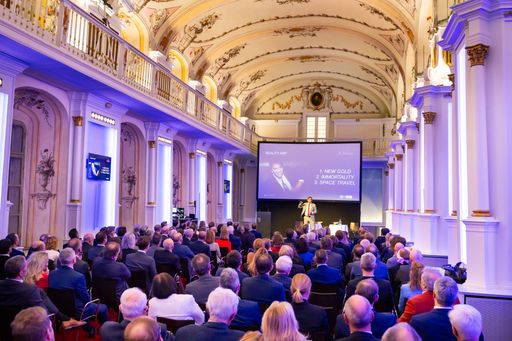The leading German futurologist, entrepreneur and author created a fascinating picture of future technical and civilizational developments in the next ten years up to 2035 Sven Gábor Jánszky in front of around 180 guests at the New Year’s reception of the German Chamber of Commerce in Austria in Graz, to which the DHK Styria State Delegation and the Honorary Consul of the Federal Republic of Germany in Styria had invited.
No looking into the crystal ball
Can you predict the future? asked Janszky. At least not by looking into the crystal ball, he replied jokingly. “You also have to put your own gut feeling aside.” “You should also separate yourself from an advisor who does not invest his own money in his forecasts,” said the keynote speaker, alluding to his own widespread economic activities.
Jánszky predicts that in five years there will be quantum computers in most companies. “You have to get data from all processes in the company”. In the future, economics will be based on forecasts. The principle will be delivery before ordering. This is called the predictive economy. “Adaptive products” that adapt to consumers’ motives and situations are a direct consequence of future research.
The real revolution will take place in the field of artificial intelligence and language as well as human robots, said Jánszky. The AI learns the language of customers through their calls to hotlines. In the future, AI will not talk to people, but rather to the AI itself about people.
Future arises from future
The biggest mistake when planning for the future is to start with an analysis of the present. “The changes come from outside, you have to analyze the future”
. It is not the accumulation of knowledge, but rather the ability to forecast that determines the success of an organization or a company. One should trust the possibilities of the future more than the experiences of the past.
Several world maps presented by the chairman of Europe’s largest scientific future institute – the 2b AHAED Group – were striking, each showing the globe from a different perspective. For China, Europe is just a small appendage to the Asian landmass, the same applies to Africa. From the U.S. perspective, Canada and Greenland are central and Panama is not far away. The geopolitical interests of the respective countries and political actors can be immediately understood from all maps.
Graz New Year’s opening event: Building an appetite for the future from the past
On the evening of January 14, 2025, the traditional joint New Year’s reception of the German Chamber of Commerce in Austria (DHK) took place in the cultivated setting of the auditorium of the Old University in Graz. The chairman of the Styrian state delegation of the DHK, Christian Jauk and the Honorary Consul of the Federal Republic of Germany in Styria, Joachim Schönbeck were able to welcome many prominent representatives of Styrian politics and business, including the industrialist and former minister Martin Bartenstein and the former CEO of Andritz AG Wolfgang Leitner as well as Josef Herk, President of the Styrian Chamber of Commerce, Kurt MaierPresident of the Styrian Industrial Association with the Deputy Managing Director Nina Zechner.
The German ambassador to Austria Vito Cecere emphasized the government in Berlin’s decisive commitment to the Mercosur agreement. Overall, there are good reasons for optimism, one being the high rate of research in both countries. In any case, the attitude of the optimist is better than that of the pessimist because “he does not ignore the problems, but tries to solve them”.
State Councilor Barbara Eibinger-Miedl had come for the Styrian state government. She assured that the new state government would also maintain Styria’s good relations with the Federal Republic of Germany. Germany remains Styria’s most important trading partner. Unfortunately, she said, exports from Styria to Germany fell by ten percent last year. The ultimately failed negotiations between the ÖVP, SPÖ and Neos for a government produced “results” that will now be useful for the negotiations between the FPÖ and ÖVP. Eibinger-Miedl firmly demanded more deregulation from the EU. “There must be a reversal in the trend in burdening companies with unnecessary regulations.”
The futurologist’s lecture Sven Gábor Jánszky “2035 – This is how we work in the future” provided the starting point for a discussion in which Christian Jauk expressed it pointedly and critically as always: No other industry is hindered by regulations in terms of innovation like the banking sector. Change has always accompanied him when you see the long list of banks that have disappeared in the last few decades. But they remained hungry and didn’t let the past spoil their appetite for the future.
The second host of the evening, the CEO of Andritz AG Joachim Schönbeck confirmed Janszky’s idea that a strong driving force for change is the desire for things to be better for the next generation. One of Andritz AG’s strengths is that it has always been able to work in the same place since 1872 and wants to stay there. But it is also important to recognize that “you always have to change something.”
The podium round was by Kathrin Ficzko moderated.
